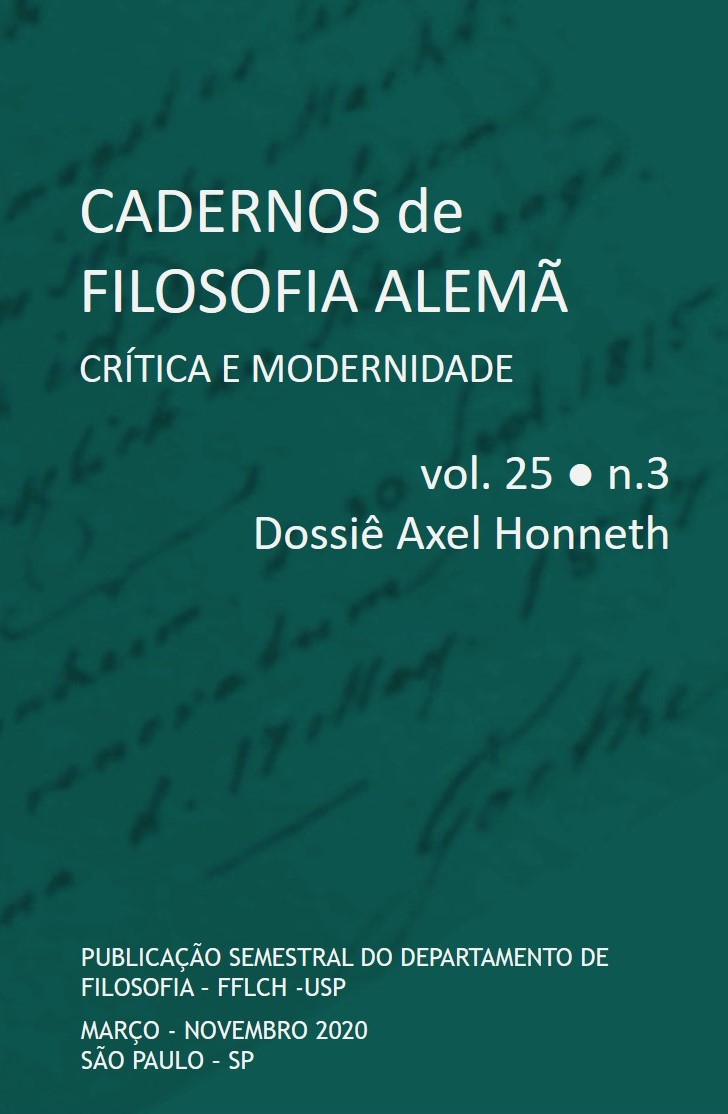Undoing Recognition? Beyond negative and positive conceptions of intersubjectivity
DOI:
https://doi.org/10.11606/issn.2318-9800.v25i3p59-74Keywords:
Recognition, Judith Butler, AmbivalenceAbstract
The purpose of this article is to discuss how Judith Butler’s late work challenges the distinction between positive and negative theories of intersubjectivity, as proposed by Rahel Jaeggi. The main hypothesis here is that this challenge has to do with her approach to ambivalence since mid-2000s, including her debate with Axel Honneth, which offers a key contribution to contemporary critical theory to diagnose social pathologies and search for emancipatory potentials in times of deep and violent polarization.
Downloads
References
Allen, A. (2008). The Politics of Ourselves: Power, Autonomy and Gender in Contemporary Critical Theory. New York: Columbia University Press.
Allen, A. (2015). Emancipação sem Utopia: sujeição, modernidade e as exigências normativas da teoria crítica Feminista. Tradução de Inara Marin, Ingrid Cyfer e Felipe Gonçalves. Novos Estudos, CEBRAP, 103, 115-132. DOI: https://doi.org/10.25091/s0101-3300201500030006
Benhabib, S.; Butler, J.; Cornell, D.; Fraser, N. (2018). Debates Feministas: um intercâmbio filosófico. Tradução de Fernanda Veríssimo. São Paulo: Unesp.
Benjamin, J. (1998). The Shadow of the Other: Intersubjectivity and Gender in Psychoanalysis. New York: Routledge.
Butler, J. ([1990], 2003). Problemas de Gênero: Feminismo e Subversão da Identidade. Rio de Janeiro: Civilização Brasileira.
Butler, J. (1997). The Psychic Life of Power: theories in subjection. Stanford University Press.
Butler, J. (2004). Undoing Gender. New York: Routledge.
Butler, J. ([2004] 2006). Precarious Life. London, New York: Verso.
Butler, J. ([2005], 2015). Relatar a si mesmo: crítica da violência ética. Tradução de Rogério Bettoni. Belo Horizonte: Editora Autêntica.
Butler, J. ([2009], 2017). Quadros de Guerra: quando a vida é passível de luto?. Rio de Janeiro: Civilização Brasileira.
Butler, J. (2018). “Adotando o ponto de vista do outro: implicações ambivalentes”. In: Honneth, A. Reificação: um estudo de teoria do Reconhecimento. Tradução de Rúrion Melo. São Paulo: Editora Unesp.
Cyfer, I. (2019a). What’s the trouble with humanity? A feminist critique of Judith Butler´s Ethics of vulnerability. Digithum, 23, 1-15.
Cyfer, I. (2019b). Arendtian Narratives: Adriana Cavarero and Judith Butler on agency and the opacity of the self. In: Silva, F.; Rosenfield, K. (eds). Martin Heidegger e Hannah Arendt no seu tempo - e no nosso. Porto Alegre, RS: Editora Fi.
Honneth, A. (2018). Reificação: um estudo de teoria do Reconhecimento. Tradução de Rúrion Melo. São Paulo: Editora Unesp.
Jaeggi, R. (2013). Reconhecimento e Subjugação: da relação entre teorias positivas e negativas da intersubjetividade. Sociologias, 15(33), 120-140. DOI: https://doi.org/10.1590/S1517-45222013000200005
Laplanche, J. ([1987], 1992). Novos Fundamentos para a Psicanálise. Tradução de Cláudia Berliner. Martins Fontes.
Lloyd, M. (ed). (2015). Butler and Ethics. Edinburgh University Press.
Petherbridge, D. (2017). O que há de Crítico na Vulnerabilidade? Repensando Interdependência, Reconhecimento e Reciprocidade. Tradução de Mariana Teixeira. Dissonância: Revista de Teoria Crítica, 1(2), 145-175.
Schippers, B. (2014). The Political Philosophy of Judith Butler. New York & London: Routledge.
Downloads
Published
Issue
Section
License
Copyright (c) 2020 Ingrid Cyfer

This work is licensed under a Creative Commons Attribution-NonCommercial-ShareAlike 4.0 International License.
Information and conceptions on the texts are complete responsibility of the authors.
All the articles submitted before July 5th 2018 and those published after July 2021 are licensed under a CC BY-NC-ND license – except those published between the aforementioned dates, which are under the CC BY-NC-SA license. The permission for the translation of the material published under the license CC BY-NC-ND by third parts can be obtained with the consent of the author.
Open access policies - Diadorim
Rules applied before July 5th 2018:
Presenting a submission to our Editorial Board implies granting priority of publication for “Cadernos de filosofia alemã”, as well as transferring the copyright of texts (once published), which will be reproduced only with the manifest authorization of the editors. Authors keep the right to reuse the texts published in future editions of their work, without paying any fees to "Cadernos”. We will not grant the permission to re-edit or translate the texts for third parts without agreement of the author.


